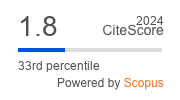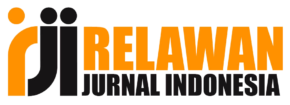Transforming LMS into KMS in Indonesia Educational Institution Case Study in Telkom University Open Library
Abstract
Library is an institution that collects printed and recorded knowledge, manages it in a particular way to meet the intellectual needs of its users through various ways of knowledge interaction. In 2021, Indonesia provided 4605 active educational institutions, ranging from universities to community academies. All these institutions are obliged to provide library to create a better learning environment, by providing source of references for each course delivered by the institution. This obligation is encouraged by the government by considering library support within the accreditation system. In this accreditation system, a library should allocate books as a source of reference to each course. This establishes a paradigm that library is where we store books and where a member of the institution may borrow, learn, and return those aforementioned books. Today, educational institution deals with not only books but also thesis, dissertation, technical report, training/workshop report, research paper, etc. Authors believe it will be prudent to leave all these documents of knowledge to librarians, by changing the library's paradigm from managing books to managing knowledge. This study proposes a model of Knowledge Management System as a transformation from Library Management System. This study also explains about expected opportunities and benefits after the transformation.
Downloads
References
N. Karna, I. Supriana, and N. Maulidevi, “Knowledge sharing between similar domain knowledge management systems,” in AIP Conference Proceedings, 2016. doi: 10.1063/1.4953988.
A. Purwinarko, W. Hardyanto, and M. A. Adhi, “Development of integrated library automation system: A case study of Universitas Negeri Semarang,” in Journal of Physics: Conference Series, Institute of Physics Publishing, Nov. 2019. doi: 10.1088/1742-6596/1321/3/032021.
K. Järvelin and P. Vakkari, “LIS research across 50 years: content analysis of journal articles,” Journal of Documentation, vol. 78, no. 7, pp. 65–88, Jan. 2022, doi: 10.1108/JD-03-2021-0062.
A. Di Vaio, B. Latif, N. Gunarathne, M. Gupta, and I. D’Adamo, “Digitalization and artificial knowledge for accountability in SCM: a systematic literature review,” Journal of Enterprise Information Management. Emerald Publishing, 2023. doi: 10.1108/JEIM-08-2022-0275.
Shanmugam A P and Ramalakshmi, “Library Management System,” Journal of Xi’an University of Architecture & Technology, vol. XII, no. XI, pp. 743–753, 2020, doi: 10.37896/JXAT12.11/29777.
L. Kisselburgh, M. Beaudouin-Lafon, L. Faith Cranor, J. Lazar, and V. Hanson, “HCI Ethics, Privacy, Accessibility, and the Environment: A Town Hall Forum on Global Policy Issues,” pp. 1–6, 2020, doi: 10.1145/3334480.3381067ï.
C. Luna, C. Raimondi, and F. Carpani, “An Educational Project Based on a Digital Library of Filmed Courses,” 2021. doi: 10.5772/intechopen.95549.
W. Graves, “Raising ACM’s Digital Library,” Commun. ACM, vol. 58, no. 3, p. 5, Feb. 2015, doi: 10.1145/2728169.
Y. Fan, W. Yuan, F. Kong, and J. Xue, “A Study of Library Window Seat Consumption and Learning Efficiency Based on the ABC Attitude Model and the Proposal of a Library Service Optimization Strategy,” Buildings, vol. 12, no. 10, Oct. 2022, doi: 10.3390/buildings12101547.
S. Sarah Sukor and Z. Ali, “An Overview of Knowledge Management in Early Childhood Education for Sustainable Education,” IOP Conf Ser Mater Sci Eng, vol. 1092, no. 1, p. 012010, Mar. 2021, doi: 10.1088/1757-899x/1092/1/012010.
N. Karna, I. Supriana, and U. Maulidevi, “Intelligent interface for a knowledge-based system,” Telkomnika (Telecommunication Computing Electronics and Control), vol. 12, no. 4, 2014, doi: 10.12928/TELKOMNIKA.v12i4.413.
D. Paulin and K. Suneson, “Knowledge Transfer, Knowledge Sharing and Knowledge Barriers – Three Blurry Terms in KM,” Electronic Journal of Knowledge Management, vol. 10, no. 1, pp. 81–91, 2012, [Online]. Available: https://research.chalmers.se/en/publication/156127
The OAI Executive, “Open Archives Initiative - Protocol for Metadata Harvesting - v.2.0.” http://www.openarchives.org/OAI/2.0/openarchivesprotocol.htm (accessed Oct. 03, 2021).
T. Iqbal and Syarifuddin, “Pengembangan Repository berbasis Archives Initiative Protocol for Metadata Harvesting (OAI-PMH) pada Standar Metadata Encoding and Transmission Standard (METS) dan MPEG-21 Digital Item Declaration Language (DIDL),” Jurnal Teknologi Informasi dan Komunikasi, vol. 5, no. 1, pp. 1–8, Aug. 2021, doi: doi.org/10.35870/jtik.v5i1.161.
N. Aletras, M. Stevenson, and P. Clough, “Computing Similarity between Items in a Digital Library of Cultural Heritage,” J. Comput. Cult. Herit., vol. 5, no. 4, Jan. 2013, doi: 10.1145/2399180.2399184.
Y.-H. Lee, P. J.-H. Hu, and C.-Y. Tu, “Ontology-Based Mapping for Automated Document Management: A Concept-Based Technique for Word Mismatch and Ambiguity Problems in Document Clustering,” ACM Trans. Manage. Inf. Syst., vol. 6, no. 1, Mar. 2015, doi: 10.1145/2688488.
N. Karna, I. Supriana, and N. Maulidevi, “Implementation of e-Learning based on Knowledge Management System for Indonesian Academic Institution,” in 2016 1st International Conference on Information Technology, Information Systems and Electrical Engineering (ICITISEE), 2016, pp. 43–48. doi: 10.1109/ICITISEE.2016.7803045.
M. Agosti and N. Ferro, “A Formal Model of Annotations of Digital Content,” ACM Trans. Inf. Syst., vol. 26, no. 1, pp. 3–es, Nov. 2007, doi: 10.1145/1292591.1292594.
V. Adamson, P. Bacsich, K. Chad, D. Kay, and J. Plenderleith, “Library Management Systems Study,” Sheffield, 2008. [Online]. Available: https://www.webarchive.org.uk/wayback/archive/20140613220103/http://www.jisc.ac.uk/media/documents/programmes/resourcediscovery/lmsstudy.pdf
N. Karna and G. Wisudiawan, “Gamelan: Academic Enterprise Resource Planning,” International Journal of Advances in Software Engineering & Research Methodology, vol. 1, no. 2, pp. 39–43, Jun. 2014, [Online]. Available: http://seekdl.org/nm.php?id=3174
Copyright (c) 2023 Jurnal RESTI (Rekayasa Sistem dan Teknologi Informasi)

This work is licensed under a Creative Commons Attribution 4.0 International License.
Copyright in each article belongs to the author
- The author acknowledges that the RESTI Journal (System Engineering and Information Technology) is the first publisher to publish with a license Creative Commons Attribution 4.0 International License.
- Authors can enter writing separately, arrange the non-exclusive distribution of manuscripts that have been published in this journal into other versions (eg sent to the author's institutional repository, publication in a book, etc.), by acknowledging that the manuscript has been published for the first time in the RESTI (Rekayasa Sistem dan Teknologi Informasi) journal ;








